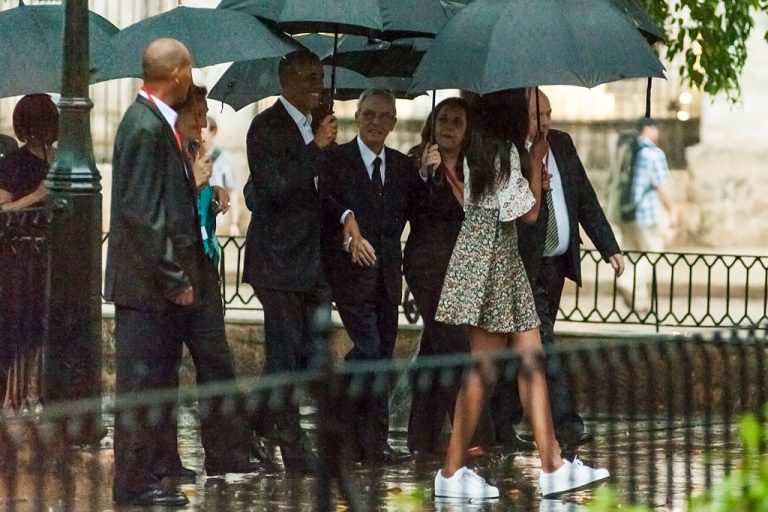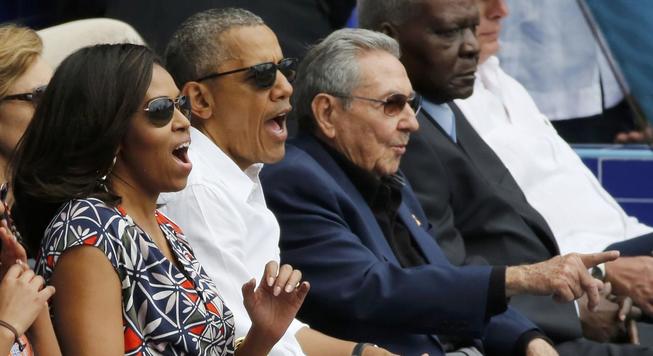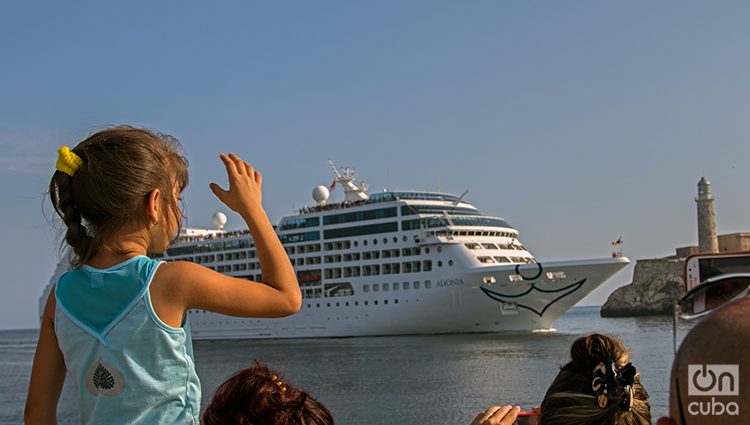I remember the afternoon of March 2016 when Eusebio Leal walked Barack Obama and his family through Cathedral Square, under an auspicious drizzle. Old Havana was taken by the Secret Service (the one that appears in House of Cards) and by Cuban Security. Without having anything to do with it, I had been confined to the roof of the Lonja del Comercio, a few steps from the radio station of the Office of the Historian, where a Univisión reporter had summoned me for an interview that turned out to be live coverage about Obama’s arrival in Havana. Trapped with no way out, I thought of Eusebio, who, being already very ill, had to fulfill his duty as host on that very rare unofficial visit by an American president, as a private visitor.

From the rooftop of Habana Radio, the Univisión reporter peppered me with questions about the Cuban delegation that walked through the airport’s runway to meet the Obamas: who, why, what does it mean, etc. I was very entertained with her inquisitions, when the presidential car appeared on the monitor screen. “How do Cubans feel when they see the Beast here for the first time here, live?” I don’t know if I looked at it or the camera: “Well, since you mentioned it, you should notice that in this country we are fans of Batman, you can’t imagine how much. The Beast is the same as the Batmobile. So it’s like we’ve known it forever.” It was the only time she laughed, apparently amused. I can’t affirm that the rest of the interview was so exhilarating, because after some of my answers about civil society, the dissidents, the Party, the military, Raúl Castro, she stopped asking me questions, and left me as incorrigible.
As I sat waiting for the curfew to be lifted, watching the Univisión monitor, I imagined what Eusebio would be feeling when accompanying the First Family, and finally leading them to meet his friend Cardinal Jaime Ortega, and thought about the lost hopes of so many venerable Ifá priests, in a neighborhood like Old Havana, ignored by the National Security deputy Ben Rhodes and the team that planned that rainy landing.
To decipher the present of relations under Trump and its future scenarios with the beginners of this conversation, it would be necessary to return to the short summer of Obama in his real political dynamics, including that historic visit, events clouded by certain accepted truths without much thought, here and there.
The main Cuban concession to the Obama government was to have trusted, contrary to the legacy of mistrust accumulated over half a century, that, this time, all the agreements reached were to be maintained, and especially the express will to advance towards the elimination of the multilateral embargo, also known as a blockade. Since the conflict has what scholars call an asymmetric structure, there is no blockade that Cuba can’t lift from the United States, thus it has not demanded, as a condition for progress, a greater opening of trade and financial regulations in that part of the mechanics of the embargo, controlled by the executive, constitute a unilateral Cuban action, lacking reciprocity and an expression of good will—that is, a concession.
Those who compare Cuban policy with that of the People’s Republic of China (PRC) and Vietnam, could verify that these two only reestablished relations, as is logical, when it was agreed to open the locks of economic sanctions, in 1978 and 1995. Cuba followed a different course from the Asian communists, probably calculating the barely 24 months that Obama had left in the Oval Office, so both agreed to start a normalization based on the opening of embassies, a decision applauded almost unanimously by Cubans and non-Cubans in all parts of the world, and that some observers had previously estimated, with a slightly diplocentric vision, as the Gordian knot of the approach.

The second concession was, of course, that historic Obama visit, with extensive coverage by domestic and foreign media. Against the universal diplomatic norm, Raúl Castro was not going to be received in the United States, neither as president, nor as a private citizen, nor as a guest of civil society. If that elementary reciprocity had existed, Obama should have sent John Kerry to the Reagan Airport to receive him, the Cuban embassy in Washington would have filled the Kennedy Center with its friends to listen to his words broadcast live by the main networks, Tom Hanks or Stephen Colbert would have appeared with him on Saturday Night Live or the CBS Late Show, African-American churches would have invited him to an ecumenical service in Meridian/Malcolm X Park, and he would have attended a game between the Orioles and a Cuban team at Camden Yards, at least. Very asymmetrical, that is, another concession.

For reasons of space, I’m going to stay in the third: American, Delta, United, and as many as 14 airlines were authorized to operate in all the Cuban airports that suited them. Cubana would not fly to any U.S. airport, not even Morgantown, West Virginia (29,000 inhabitants). Obviously, the lion’s share of the transportation earnings of the more than 700,000 passengers who began arriving in Cuba each year went to the other side over there.
Now, that short Obama summer produced the largest harvest of symmetrical agreements in the history of Cuba-U.S. relations, for which, as they say, it takes two to tango. As I already pointed out in another conversation, the concretion and implementation of these 23 agreements, over two years, shows that, against the supposed stagnation or “implosion” of this process, according to some, the two parties cooperated and they were negotiating until the end. Most of these agreements, not surprisingly, refer to security topics. Among the most important were consolidating cooperation between the coastguard services in the areas of migration and drug trafficking, search and rescue of ships, air transport security measures, cooperation in law enforcement. Also, the 12 categories of general license to visit Cuba, the commercial airlines service (between several cities on both sides), the license for cooperation in cancer treatment of the Rockwell Institute with the Center for Molecular Immunology, direct postal servicw, the exchange of meteorological and climatic information, among others.
If there was a trickle or slowness in reaching some, it was not because the Cuban stopcock was closed, but because of the reluctance of the United States to adopt certain decisive steps, such as the cancellation of the wet foot-dry foot policy, only implemented in the last days of the Obama administration.
Although the balance of that visit was positive, and aroused the recognition of the majority of Cubans, it was a challenge that the island’s government took on, despite its contradictions. The main contradiction was in its declaration of not continuing the previous policy, affirming that “change in Cuba is a matter for Cubans,” and then, that “normalization with the United States is opening the door to changes in Cuba,” and, according to Rhodes’ script published on the official government site to identify some of the objectives of the visit, to express “his deep disagreement with the Cuban government” on “respect for human rights.”
https://oncubanews.1eye.us/cuba-ee-uu/hitos-cuba-los-estados-unidos-desde-17d/
To say that Trump’s reign has been bad would be commonplace. For Cuba, the earliest and most visible change, the worst of all, was renewed hostility in presidential rhetoric. It’s unlikely, however, that, in relative terms, the island was among the countries most shaken by this hostility, a historical pattern that has become customary. In fact, few have experienced comparable training in bad weather of this magnitude.
So the economic strangulation measures applied since the summer of 2017 were not exactly novel, although they have caused noticeable damage. The only really unexpected one was the closure of the consulates, a blow to families with an effect extended to Cuban-American society, which has remained in limbo for two years after the mystery of the so-called “sonic attacks.” Despite this ongoing damage, rather than collateral, the truth is that the application of Title IV did not trigger the advocated frenzy of litigations; that although the interruption of the cruises did reduce the number of visitors, it did not have a proportional impact on real income, except for a group of Havana paladares and private taxis, not the hostels or the rest of the country; that commercial airlines have never interrupted their flights, although the number of visitors fell significantly, but not to the extent anticipated, and even grew among Cuban-Americans, until COVID-19 made its appearance.
https://oncubanews.1eye.us/cuba-ee-uu/los-cambios-de-trump/
The logic of this new boom in Cuba-U.S. hostility, as occurred before with the Sandinista Revolution and the Central American wars, at the end of the Carter administration and especially Reagan’s, has not been merely electoral, but geopolitical. To put it bluntly, Venezuela is at the main vertex of this offensive; and Cuba is rather an angle of the triangle. Its drive doesn’t respond so much to the ideological banners raised in the speeches, to the irrefutable overflow of Trumpism, or to the Miamization of Cuban politics in the United States, but rather to specific, very concrete goals, with a certain rational foundation: the overthrow of Chavism. Cuba is punished for supporting it. Looking no further into that political reason, and seeing it as a way to overthrow the Cuban government, has been nothing more than a dream of that reason, which has spawned monsters and now grotesque characters, but nothing more. As they say, it’s not for real: end of story.
On the other hand, suppose this hostility dictated by geopolitical perceptions of Venezuela is going to vanish because certain officials (Bolton, Claver-Carone, etc.) have left or are leaving, chosen (and then fired) by an inner circle that outlines policy, reflects a reading that confuses the formulators of this strategic vision with those in charge of its staging.
To consider that this administration has had something good for Cuba is an oxymoron. However, not everything has been disastrous or useless.
Its pure and hard countenance resembles more the historical nature of that policy, a lesson that survives the big smiles of Jimmy Carter or Barack Obama. As argued in other texts in this series, it’s not about personalities, but about a pattern of interests and an established geopolitical logic. Nothing exceptional for those of us who live down here, and that is repeated, by the way, between large and small neighbors almost all over the world, regardless of their political regimes and even ideological affiliations.

Although some observers have attributed to it the effect of rekindling the embers of recalcitrant anti-Castroism in Miami, perhaps no previous policy has caused greater direct damage to the interests of the supposed electoral base of that anti-Castroism, that is, to the Cuban-American community. Thus, it has marked the differences in interests between Cubans on both sides, on the one hand, and the mechanics of hostility, on the other. This context is conducive to a leap forward in national policy towards immigrants, totally unrelated to the vicissitudes of bilateral relations, and even against them, and which the Cuban government has pending as part of the internal reforms it is committed to. If this leap occurred under Trump, no one could later attribute it to the influence of a friendlier U.S. president, or read it as a hostage to relations with the North. All the more reason why the meeting dedicated to the topic, scheduled for April this year and postponed because of COVID-19, was no longer continued to be left for later.
The Trump stage has also served to test, once again, the hypothesis that some defend (without evidence), that U.S. policy would change in response to the advance of internal changes on the island. It did not happen before, when the Armed Forces were halved and economic measures were adopted in 1993-96 that we know of. Nor between 2017 and 2020, when larger-scale changes occurred, such as the forming of a new government, approval of a new constitution with legitimization of private enterprises, and an unprecedented emphasis on decentralization, market expansion, the start of a reformist legislative program, expansion of the quality and access to the internet, as well as public debate and the freedom to exercise political criticism, not forgetting the most recent measures adopted in the wake of the pandemic, return of the dollar, etc. Seen in the mirror of American politics, they are all invisible; rather they would seem to have fueled its fury.
As noted in another conversation, despite the punch attributed to Marco Rubio, Bolton, Claver-Carone, and other recurring characters in the mechanics towards Cuba, most of the agreements signed under Obama have not been revoked. So, if Joseph Biden wins the elections, it would be enough to open the drawer where they are kept, since only four have not been implemented, and one is pending congressional approval; while the remaining 16 have resisted virulence of the past three and a half years. The only category of travel removed has been people-to-people, plausible not just for visitors from over there, but for most Cubans today, including the government. A nod from him would be enough for the check-up and exchange meetings of the two parties to resume, and for the diplomatic personnel withdrawn from both sides to return to their posts. I say: has anyone heard of “sonic attacks” reported in the past few months? Now that we’re all hanging around with masks, that would seem like a pale ghost in the midst of this real health threat.
Unlike previous stages, when think tanks such as Inter-American Dialogue, Rand Corporation, Americas Society, Council on Foreign Relations or Brookings competed for a draft strategy to deal with Cuba, none would be able to overcome the structured plan that Obama (and Susan Rice) left ready, entitled Presidential Policy Directive–United States-Cuba Normalization.
Several questions about the future remain in the pipeline. How important would Cuba be to a Democratic administration? To what extent would the Venezuelan question be channeled in another way? Would Trumpism survive without Trump on certain issues, such as migration, relations with China and Russia, policies at multilateral organizations? To what extent would the meetings between the two societies recover, to serve as a basis for relations that would promote those values that over there are called free trade and freedom to travel?
Perhaps some ideas raised in these conversations with beginners could be useful to think these and other questions, such as, for example, not to confuse the analysis and understanding of the policies of both sides with personalities, opinions and each one’s desires, likes and dislikes, nor to believe that cursing a policy helps to understand which road it will take.
Of course, peace with the United States would favor the socialist transition in Cuba. Preventing that peace from being completely extinguished, and minimizing the enormous human, social and political costs of the conflict, are a central part of the national interest. At the same time, channeling the present and consolidating the future of that transition on the premise of that peace would lack realism. To what extent and how to move forward so that the changes and goals are not mere hostages of this uncertain relationship involve larger problems that deserve a further look.










